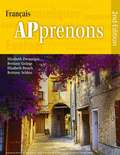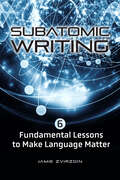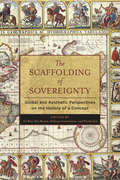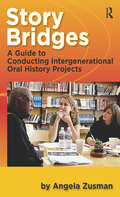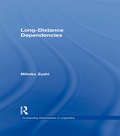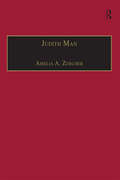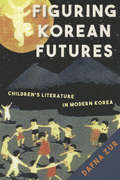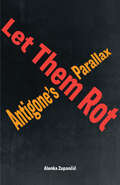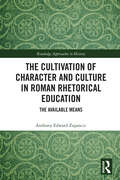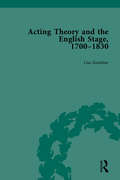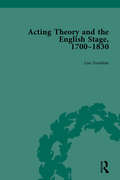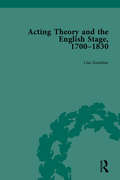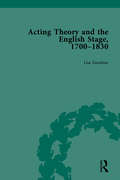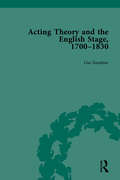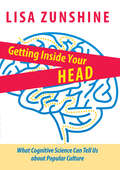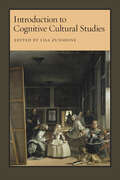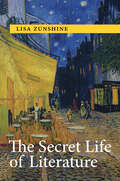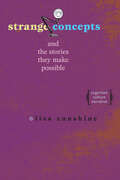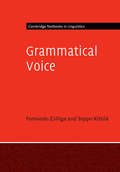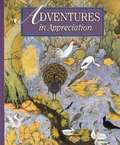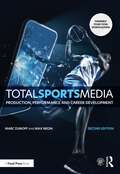- Table View
- List View
Apprenons: Francais
by Elizabeth Zwanziger Brittany Goings Elizabeth Rench Brittany Selden GriffinNIMAC-sourced textbook
Subatomic Writing: Six Fundamental Lessons to Make Language Matter
by Jamie ZvirzdinSee science writing fundamentals afresh through a subatomic lens!In Subatomic Writing, Johns Hopkins University instructor Jamie Zvirzdin goes bravely into uncharted territory by offering a totally new kind of guide for writing about science—from the subatomic level up! Subatomic Writing teaches readers that the building blocks of language are like particles in physics. These particles, combined and arranged, form something greater than their parts: all matter in the literary universe. The six levels of language covered in this guide create writing that illuminates and energizes the reader to feel, learn, change, and act. This interdisciplinary approach helps scientists, science writers, and editors improve their writing in fundamental areas as they build from the sounds in a word to the pacing of a paragraph. These areas include• Sound and sense• Word classes• Grammar and syntax• Punctuation• Rhythm and emphasis• Pacing and coherenceEqually helpful for students who need to learn how to write clearly about science and scientists who need to hone their writing skills to create more effective course material, papers, and grant applications, this guide builds confidence in writing abilities as old skills are taught in new, exciting ways. Each lesson provides exercises that build on each other, strengthening readers' capacity to communicate ideas and data, all while learning basic particle physics along the way.
The Scaffolding of Sovereignty: Global and Aesthetic Perspectives on the History of a Concept (Columbia Studies in Political Thought / Political History)
by Zvi Ben-Dor Benite Stefanos Geroulanos Nicole JerrWhat is sovereignty? Often taken for granted or seen as the ideology of European states vying for supremacy and conquest, the concept of sovereignty remains underexamined both in the history of its practices and in its aesthetic and intellectual underpinnings. Using global intellectual history as a bridge between approaches, periods, and areas, The Scaffolding of Sovereignty deploys a comparative and theoretically rich conception of sovereignty to reconsider the different schemes on which it has been based or renewed, the public stages on which it is erected or destroyed, and the images and ideas on which it rests.The essays in The Scaffolding of Sovereignty reveal that sovereignty has always been supported, complemented, and enforced by a complex aesthetic and intellectual scaffolding. This collection takes a multidisciplinary approach to investigating the concept on a global scale, ranging from an account of a Manchu emperor building a mosque to a discussion of the continuing power of Lenin’s corpse, from an analysis of the death of kings in classical Greek tragedy to an exploration of the imagery of “the people” in the Age of Revolutions. Across seventeen chapters that closely study specific historical regimes and conflicts, the book’s contributors examine intersections of authority, power, theatricality, science and medicine, jurisdiction, rulership, human rights, scholarship, religious and popular ideas, and international legal thought that support or undermine different instances of sovereign power and its representations.
Word Wisdom: Vocabulary for Listening, Speaking, Reading and Writing, Level D
by Jerry ZutellNIMAC-sourced textbook
Word Wisdom: Vocabulary for Listening, Speaking, Reading and Writing, Level G
by Jerry ZutellNIMAC-sourced textbook
Word Wisdom Unlocking Vocabulary in Context, Grade 6
by Jerry ZutellWord Wisdom Unlocking Vocabulary in Context
Story Bridges: A Guide for Conducting Intergenerational Oral History Projects (Practicing Oral History #1)
by Angela ZusmanAngela Zusman offers an informative guidebook with step-by-step directions for planning and implementing intergenerational oral history projects, using youth to interview elders. An expert on these programs, Zusman uses her experiences and those of other oral historians to show how community projects are organized, youthful historians located and trained, interviews conducted, and the project archived for future community needs. Included are a variety of sample documents and case studies designed to ease the process for the uninitiated.
Long-Distance Dependencies (Outstanding Dissertations in Linguistics)
by Mihoko ZushiThis book investigates the theory of locality within the framework of minimalism, with a special focus on restructuring and other related phenomena that exhibit an apparent violation of the strictly local conditions.
Judith Man: Printed Writings 1500–1640: Series I, Part Three, Volume 2 (The Early Modern Englishwoman: A Facsimile Library of Essential Works & Printed Writings, 1500-1640: Series I, Part Three #Pt. 3)
by Amelia A. ZurcherAn Epitome of the History of Faire Argenis and Polyarchus is Judith Man's English translation of a 1623 French work by Nicolas Coeffeteau, Histoire de Poliarque et d'Argenis, which is itself an abridgement and translation of one of the most widely read fictional works of the seventeenth century, John Barclay's 1621 Latin romance Argenis. An extended political allegory of the rise to power of the French king Henri IV, Barclay's romance is peppered with numerous veiled anecdotes of politics at the English and other European courts and long disquisitions on statecraft and political ethics. It has been assumed that Barclay's work was strictly for a male audience, but Man's translation is evidence that women did in fact read Argenis, and might even suggest that allegorical romance offered women writers and readers an inroad into political discourse.
Figuring Korean Futures: Children’s Literature in Modern Korea
by Dafna ZurThis book is the story of the emergence and development of writing for children in modern Korea. Starting in the 1920s, a narrator-adult voice began to speak directly to a child-reader. This child audience was perceived as unique because of a new concept: the child-heart, the perception that the child's body and mind were transparent and knowable, and that they rested on the threshold of culture. This privileged location enabled writers and illustrators, educators and psychologists, intellectual elite and laypersons to envision the child as a powerful antidote to the present and as an uplifting metaphor of colonial Korea's future. Reading children's periodicals against the political, educational, and psychological discourses of their time, Dafna Zur argues that the figure of the child was particularly favorable to the project of modernity and nation-building, as well as to the colonial and postcolonial projects of socialization and nationalization. She demonstrates the ways in which Korean children's literature builds on a trajectory that begins with the child as an organic part of nature, and ends, in the post-colonial era, with the child as the primary agent of control of nature. Figuring Korean Futures reveals the complex ways in which the figure of the child became a driving force of nostalgia that stood in for future aspirations for the individual, family, class, and nation.
Let Them Rot: Antigone’s Parallax (Idiom: Inventing Writing Theory)
by Alenka ZupančičA provocative, highly accessible journey to the heart of Sophocles’ Antigone elucidating why it keeps resurfacing as a central text of Western thought and Western culture.There is probably no classical text that has inspired more interpretation, critical attention, and creative response than Sophocles’ Antigone. The general perspective from which the book is written could be summarized with this simple question: What is it about the figure of Antigone that keeps haunting us? Why do all these readings and rewritings keep emerging? To what kind of always contemporary contradiction does the need, the urge to reread and reimagine Antigone—in all kinds of contexts and languages—correspond? As key anchor points of this general interrogation, three particular “obsessions” have driven the author’s thinking and writing about Antigone. First is the issue of violence. The violence in Antigone is the opposite of “graphic” as we have come to know it in movies and in the media; rather, it is sharp and piercing, it goes straight to the bone. It is the violence of language, the violence of principles, the violence of desire, the violence of subjectivity. Then there is the issue of funerary rites and their role in appeasing the specific “undeadness” that seems to be the other side of human life, its irreducible undercurrent that death alone cannot end and put to rest. This issue prompted the author to look at the relationship between language, sexuality, death, and “second death.” The third issue, which constitutes the focal point of the book, is Antigone’s statement that if it were her children or husband lying unburied out there, she would let them rot and not take it upon herself to defy the decree of the state. The author asks, how does this exclusivist, singularizing claim (she would do it only for Polyneices), which she uses to describe the “unwritten law” she follows, tally with Antigone’s universal appeal and compelling power? Attempting to answer this leads to the question of what this particular (Oedipal) family’s misfortune, of which Antigone chooses to be the guardian, shares with the general condition of humanity. Which in turn forces us to confront the seemingly self-evident question: “What is incest?”Let Them Rot is Alenka Zupančič’s absorbing and succinct guided tour of the philosophical and psychoanalytic issues arising from the Theban trilogy. Her original and surprising intervention into the broad and prominent field of study related to Sophocles’ Antigone illuminates the classical text’s ongoing relevance and invites a wide readership to become captivated by its themes.
The Cultivation of Character and Culture in Roman Rhetorical Education: The Available Means (Routledge Approaches to History)
by Anthony Edward ZupancicAt its very center, The Cultivation of Character and Culture in Roman Rhetorical Education: The Available Means is a study of the subtle, organic ways that rhetoric can work to cultivate a particular character. This is an extension of the current work in composition studies, which focus on the ways that writing instruction contributes to the development of individual power and agency in students, combined with an ancient understanding of the ways that students learned to act within a particular, accepted cultural framework. It recognizes and reclaims a lost dimension of rhetoric, a dimension that is conceptually linked to the martial culture of the ancient world, to show how ancient rhetorical theory framed the discipline as an education in thinking, speaking, and acting in ways that were necessary to be both a persuasive speaker and an effective leader. Through close readings and analysis of particular rhetorical exercises, the book shows how rhetorical education shaped characters that were appropriate in the eyes of the dominant culture but were also capable of working independently to progressively alter that culture. In showing the ways that rhetorical education shaped a particular character, the book demonstrates the ways that the combination character, culture, and virtue are vital to leadership in any time.
Acting Theory and the English Stage, 1700-1830 Volume 1
by Lisa ZunshineDuring the eighteenth century, treatises on the science of elocution, gesture and naturalness abounded. This title draws together a representative selection of the most difficult-to-access texts in the period. It helps cultural historians to examine the place of stagecraft in the eighteenth-century imagination.
Acting Theory and the English Stage, 1700-1830 Volume 2
by Lisa ZunshineDuring the eighteenth century, treatises on the science of elocution, gesture and naturalness abounded. This title draws together a representative selection of the most difficult-to-access texts in the period. It helps cultural historians to examine the place of stagecraft in the eighteenth-century imagination.
Acting Theory and the English Stage, 1700-1830 Volume 3
by Lisa ZunshineDuring the eighteenth century, treatises on the science of elocution, gesture and naturalness abounded. This title draws together a representative selection of the most difficult-to-access texts in the period. It helps cultural historians to examine the place of stagecraft in the eighteenth-century imagination.
Acting Theory and the English Stage, 1700-1830 Volume 4
by Lisa ZunshineDuring the eighteenth century, treatises on the science of elocution, gesture and naturalness abounded. This title draws together a representative selection of the most difficult-to-access texts in the period. It helps cultural historians to examine the place of stagecraft in the eighteenth-century imagination.
Acting Theory and the English Stage, 1700-1830 Volume 5
by Lisa ZunshineDuring the eighteenth century, treatises on the science of elocution, gesture and naturalness abounded. This title draws together a representative selection of the most difficult-to-access texts in the period. It helps cultural historians to examine the place of stagecraft in the eighteenth-century imagination.
Getting Inside Your Head: What Cognitive Science Can Tell Us about Popular Culture
by Lisa ZunshineUsing the psychological concept called theory of mind, Lisa Zunshine explores the appeal of movies, novels, paintings, musicals, and reality television.Winner of the CHOICE Outstanding Academic Title of the Choice ACRLWe live in other people's heads: avidly, reluctantly, consciously, unaware, mistakenly, and inescapably. Our social life is a constant negotiation among what we think we know about each other's thoughts and feelings, what we want each other to think we know, and what we would dearly love to know but don't.Cognitive scientists have a special term for the evolved cognitive adaptation that makes us attribute mental states to other people through observation of their body language; they call it theory of mind. Getting Inside Your Head uses research in theory of mind to look at movies, musicals, novels, classic Chinese opera, stand-up comedy, mock-documentaries, photography, and reality television. It follows Pride and Prejudice’s Mr. Darcy as he tries to conceal his anger, Tyler Durden as he lectures a stranger at gunpoint in Fight Club, and Ingrid Bergman as she fakes interest in horse races in Notorious.This engaging book exemplifies the new interdisciplinary field of cognitive cultural studies, demonstrating that collaboration between cognitive science and cultural studies is both exciting and productive.
Introduction to Cognitive Cultural Studies
by Lisa ZunshineDrawing on the explosion of academic and public interest in cognitive science in the past two decades, this volume features articles that combine literary and cultural analysis with insights from neuroscience, cognitive evolutionary psychology and anthropology, and cognitive linguistics. Lisa Zunshine’s introduction provides a broad overview of the field. The essays that follow are organized into four parts that explore developments in literary universals, cognitive historicism, cognitive narratology, and cognitive approaches in dialogue with other theoretical approaches, such as postcolonial studies, ecocriticism, aesthetics, and poststructuralism. Introduction to Cognitive Cultural Studies provides readers with grounding in several major areas of cognitive science, applies insights from cognitive science to cultural representations, and recognizes the cognitive approach’s commitment to seeking common ground with existing literary-theoretical paradigms. This book is ideal for graduate courses and seminars devoted to cognitive approaches to cultural studies and literary criticism.Contributors: Mary Thomas Crane, Nancy Easterlin, David Herman, Patrick Colm Hogan, Bruce McConachie, Alan Palmer, Alan Richardson, Ellen Spolsky, G. Gabrielle Starr, Blakey Vermeule, Lisa Zunshine
The Secret Life of Literature
by Lisa ZunshineAn innovative account that brings together cognitive science, ethnography, and literary history to examine patterns of &“mindreading&” in a wide range of literary works.For over four thousand years, writers have been experimenting with what cognitive scientists call &“mindreading&”: constantly devising new social contexts for making their audiences imagine complex mental states of characters and narrators. In The Secret Life of Literature, Lisa Zunshine uncovers these mindreading patterns, which have, until now, remained invisible to both readers and critics, in works ranging from The Epic of Gilgamesh to Invisible Man. Bringing together cognitive science, ethnography, and literary studies, this engaging book transforms our understanding of literary history. Central to Zunshine&’s argument is the exploration of mental states &“embedded&” within each other, as, for instance, when Ellison&’s Invisible Man is aware of how his white Communist Party comrades pretend not to understand what he means, when they want to reassert their position of power. Paying special attention to how race, class, and gender inform literary embedments, Zunshine contrasts this dynamic with real-life patterns studied by cognitive and social psychologists. She also considers community-specific mindreading values and looks at the rise and migration of embedment patterns across genres and national literary traditions, noting particularly the use of deception, eavesdropping, and shame as plot devices. Finally, she investigates mindreading in children&’s literature. Stories for children geared toward different stages of development, she shows, provide cultural scaffolding for initiating young readers into a long-term engagement with the secret life of literature.
Strange Concepts and the Stories They Make Possible: Cognition, Culture, Narrative
by Lisa ZunshineIn this fresh and often playful interdisciplinary study, Lisa Zunshine presents a fluid discussion of how key concepts from cognitive science complicate our cultural interpretations of "strange" literary phenomena.From Short Circuit to I, Robot, from The Parent Trap to Big Business, fantastic tales of rebellious robots, animated artifacts, and twins mistaken for each other are a permanent fixture in popular culture and have been since antiquity. Why do these strange concepts captivate the human imagination so thoroughly? Zunshine explores how cognitive science, specifically its ideas of essentialism and functionalism, combined with historical and cultural analysis, can help us understand why we find such literary phenomena so fascinating.Drawing from research by such cognitive evolutionary anthropologists and psychologists as Scott Atran, Paul Bloom, Pascal Boyer, and Susan A. Gelman, Zunshine examines the cognitive origins of the distinction between essence and function and how unexpected tensions between these two concepts are brought into play in fictional narratives. Discussing motifs of confused identity and of twins in drama, science fiction’s use of robots, cyborgs, and androids, and nonsense poetry and surrealist art, she reveals the range and power of key concepts from science in literary interpretation and provides insight into how cognitive-evolutionary research on essentialism can be used to study fiction as well as everyday strange concepts.
Grammatical Voice (Cambridge Textbooks in Linguistics)
by Fernando Zúñiga Seppo KittiläThe grammatical category of voice covers a wide range of phenomena, including causatives, applicatives, passives, antipassives, middles, and others. Drawing on data from over 200 languages, Fernando Zúñiga and Seppo Kittilä illustrate the semantic, morphological, and syntactic variation of voice across languages from a range of families and regions. They approach the topic from a broad and explicit perspective, and discuss a variety of topics that are not always regarded as voice, in order to make a clear and useful conceptual delimitation. Clearly organized and accessibly written, the book will be welcomed by students and scholars of linguistics, especially those interested in how grammatical categories work.
Adventures in Appreciation (Athena Edition)
by Glenda Zumwalt Carroll Moulton William BassellThe book is a collection of poems, stories, dramas and biographies from different books. It has questions at the end of each section, breaks down the process of essay writing and also defines some vocabulary at the end of each illustration.
Total Sports Media: Production, Performance and Career Development
by Marc Zumoff Max NeginThis thoroughly revised second edition of Total Sports Media (formerly Total Sportscasting) offers a complete guide to sports media across TV, radio and digital broadcasting. Covering everything from practical skills to industry lingo, this book guides readers through each aspect of the sportscasting process, including performance and production techniques, demo reel production, and writing for sports media. Chapters feature interviews with successful sports media professionals who take you inside the real-world practices of the industry, offering invaluable insights on how to carve out a career in the field and forge lasting relationships with team personnel. New to this edition are a discussion of changes in the industry as a result of the Covid-19 pandemic, updated sections on career paths and professional development opportunities, and an updated chapter on social media strategies for sportscasters. This book also delves into the unique issues facing women and minority sportscasters. Finally, the authors look at the history of sports media and discuss the future of the industry. Total Sports Media is an essential resource for both students and instructors of sports media, as well as for industry professionals interested in a wide-reaching look at this changing field. A companion website features additional resources for instructors and students, including video and audio examples and links to additional resources.
